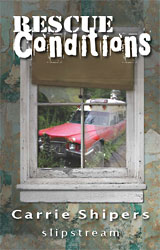
|
"At once feisty and powerful, Carrie Shipersís poems help us remember secret warnings we learn as children: to love hard
against violence, to take what we get, to escape when we can, to remember every detail for a brilliant imagination to unpack and revive: 'stories they
lived without learning/what they meant.' At last we have a poet to teach us what she learned, that 'whatís broken matters less than how it heals.'
To read Rescue Conditions is to experience the pure joy of recovering family identities—as heroes, outlaws, lovers, and tender citizens—
through art."
— Hilda Raz
Rescue Conditions Copyright 2008 by Carrie Shipers
|
Carrie Shipers

Carrie Shipers is a doctoral candidate at the University of Nebraska-Lincoln where she teaches in the English department and works on the staff of Prairie Schooner. Her first chapbook, Ghost-Writing, was published by Pudding House in 2007. Her poems have appeared in Crab Orchard Review, Haydenís Ferry Review, and Mid-American Review among other literary journals and magazines.
|
|
Rescue Conditions
Like fairy tales, my motherís stories were meant
to order the world: Once, there was a fourteen-year-
old girl, a windshield, a barbed wire fence.
Once, there was a man your father knew,
a gravel road, a cargo rack, a passenger
pinned like a frog.
I used to imagine myself
victim of more benign emergencies:
a fainting spell at school; a car accident
with no injuries except one long, dramatic cut
that wouldnít scar; my head hitting the gym floor
so hard no one would let me move. I wanted
to be rescued from what wasnít my fault,
the stretcher and straps a glass coffin to bear away
my blameless body. Instead, I was bitten
by a poisonous spider. I broke my ankle,
caught bronchitis, was dehydrated by the flu.
I lived by the rules my mother made:
Wear your seatbelt. Stay away from guns.
Donít drink or take rides from people who do.
Lie to me and youíll be sorry.
Always, I heard
warnings she wouldnít say: If you die in pieces
on a dirt road it takes two hours to fi nd; if you slit
your loverís throat and try to slit your own,
trailing blood all over the house; if you fall down
in a cornfi eld and no one knows till you start
to rotódonít make me be who finds you.
I never said how much I needed to be found,
to feel her gloved hands holding mine and know
sheíd save me even from the ending I deserved.
Copyright ©2008 Carrie Shipers
Waiting for Spring, 1981
Mud sucks the boots off his feet and the hot
from his coffee till his hammer goes clumsy
with cold. All fall he drives home dripping.
It could be worse, he tells his wife, stripping
his muddy jeans on newspapers spread
by the kitchen door. At least Iím working.
After the factory killed his father, he swore
heíd work outside. He hadnít been thinking
of snow, gray afternoons spent hauling brush
or shoveling scrap wood at the mill for cash
creased into his pocket. If he stops
in a bar he goes home guiltyófour kids
he can barely keep in milk. Thereís no overtime
for unemployment even though he earns it
in his dreams, breathing sawdust and sweat
while his family sleeps. He wakes up wanting
whiskey but settles for a beer, pretending
he canít hear his father say with every swallow:
Men who drink their pride are always thirsty.
Copyright ©2008 Carrie Shipers
|
Job Description
Our first ten years were one emergency
after the other, him or the kids or me,
always someone bleeding, fevered, scared,
and even when I didnít know what to do,
I pretended I did. I got out peroxide
or aspirin, reasons why weíd be okay.
He thinks my work will bring bad luck, disease
or sorrow I canít shake. Tending strangers
by the side of the road, he says, youíll get
yourself hurt. Iíve tried to show him
how safe I am, the gloves and sterile pads,
radio clipped to my belt, my partner
always close by. He doesnít see how much
I need disasters that arenít mine, to know
I can fix what isnít my fault. In my uniform,
I walk into someone elseís mess
of unwashed dishes or broken glass, pry open
car doors crushed against their frames.
With my flashlight, I shed what light I can
Copyright ©2008 Carrie Shipers
|
|



